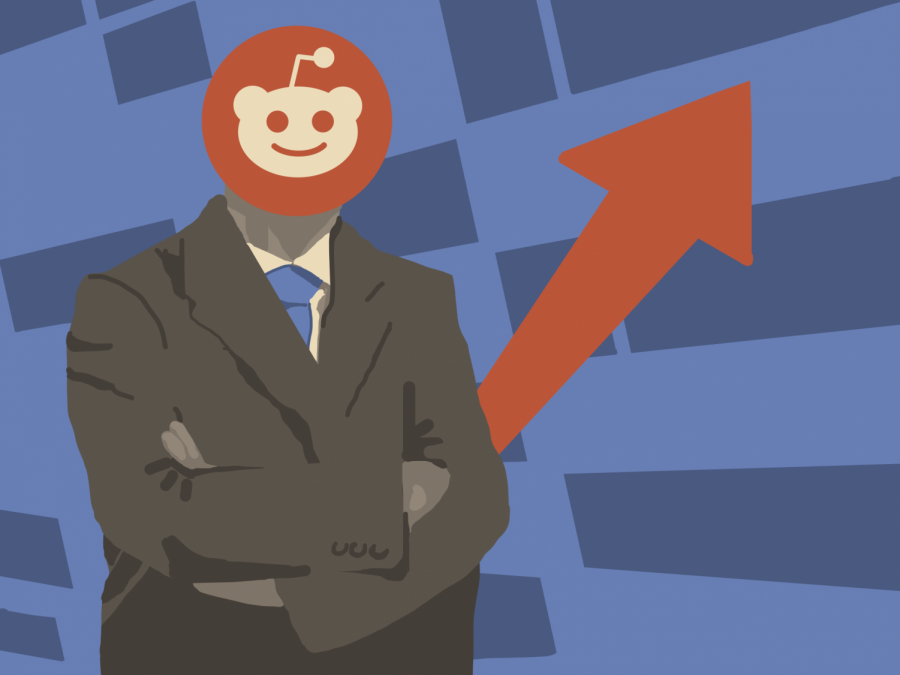Stocks to the Moon
The rapid and abundant buying of GameStop was not just an internet fad, but an ingenious protest that revealed dark truths about the American Stock Exchange.
March 16, 2021
Whether you’re a seasoned shareholder or you know nothing about the stock market, you’ve likely heard about what redditors from r/wallstreetbets did just months ago: sent the price of GameStop beyond the stratosphere, for a brief period of time at least.
How did this whole situation begin? Well, back in 2014, hedge fund Melvin Capital shorted—or bet against company stock—GameStop 140% float, which indicates an expected decrease of 140% of all publicly traded shares. Melvin Capital is one of the top stock pickers in the market and founder Gabriel Plotkin is “one of the giants of our era,” as billionaire investor Chamath Palihapitiya claims. Because of its credibility, Melvin Capital trades are often copied by smaller firms. So, when GameStop stock prices were inflated by redditors on r/wallstreetbets this January, hundreds of firms on Wall Street who had bet against the company lost billions of dollars.
However random their actions may have seemed to the general public, the members of r/wallstreetbets did extremely high level market analysis before investing in GameStop. They saw that, contrary to Melvin Capital’s evaluation, the video game company was not expected to fail this year. So, they effectively exposed the overshorted company. After a little push from heavy investors, the price of GME increased from $17.25 to a peak of $347.51 per share as the trend became viral. Some redditors became multi-millionaires overnight as the hedge funds lost billions. Many have been able to pay off student loans and mortgages.
While the initial trades were based on GME’s potential to surge, the trades evolved into a wider movement with a new purpose: to push back against the hedge funds on Wall Street. Many firms on Wall Street were directly responsible for the 2008 housing crisis and, since many taxpayers were forced to bail out the very same people who crashed the economy, some viewed the GameStop movement as a form of revenge.
Some might claim this is a form of market manipulation (that could land members some serious jail time), and by definition it is. However, under the lax laws of the stock exchange, the line between market manipulation and the First Amendment right to freedom of speech is a very thin one—well, depending on who is exercising it. Hedge funds, for one, are not penalized for hosting private dinners, where the market’s leaders exchange stock ideas behind closed doors in order to cooperate. So, what separates them from an online forum such as Reddit? Nothing, except that the stock market seems not to be intended for the public. Naturally, it caused some concern when the unorganized masses were able to make money at the expense of brokers on Wall Street. Using this obvious double standard to their advantage, the Internet revealed to the government that, under this government regulation of the stock market—or lack thereof—, market volatility and manipulation is inevitable. Banding together in an intelligent form of protest, they showed that it is as easy to destroy a company like GameStop as it is to make it boom.
The massive, even if brief, success of GameStop has opened Pandora’s box as the possibility of a triumphant demonstration was revealed: the SEC (U.S. Securities and Exchange Commission) head has called for more regulation. However, while it is good news that new regulations are being put into place to reduce volatility in the stock market, the timing cannot be understated. When hedge funds lost, the rules were changed, which only goes to show that participation in the market is still apparently exclusive. Only now, the power that hedge funds have will be harder to be abused. This is but the first step; the stock market should be held accountable for the failures they caused. Redditors joining arms was a moving display of the common people against a corporate evil, the public punished a system in need of more regulation. And if that system is not better regulated, that same public may continue to send prices to the moon.


